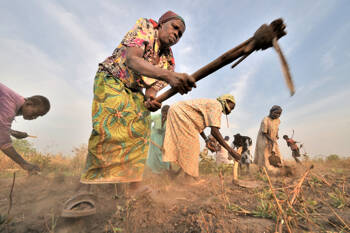If farmers in Africa had greater access to fertile, arable land safe from armed conflict and pollutants, they would not need genetically modified crops to produce food, said the head of the Pontifical Council for Justice and Peace.
Making growers reliant on proprietary, genetically modified seeds smacks of "the usual game of economic dependence," which in turn, "stands out like a new form of slavery," said Cardinal Peter Turkson.
The Ghanaian cardinal's comments came in an interview with the Vatican newspaper L'Osservatore Romano Jan. 5. It is "a scandal" that nearly 1 billion people suffer from hunger, Cardinal Turkson said, especially since there is more than enough food to feed the whole world.
Crops and livestock are destroyed because of strict trade restraints or in order to keep food prices high and, in wealthier countries, edible food "is thrown in the garbage," he said. "All it would take is a little bit more solidarity and much less egoism" and there would be enough food to nourish even twice the current world population, he said.
The cardinal said high-tech agricultural practices and techniques are all but useless in areas of conflict and areas that are ravaged by the exploitation of natural resources. "In searching for and extracting petroleum, gold or precious minerals present under African soil, multinationals cause enormous damage: they excavate large pits and irreparably devastate fields and forests," he said. Whether such areas would ever be arable again is uncertain "even if one relied on genetically engineered plants."
Cardinal Turkson said some multinational companies are actively engaged in trying to persuade bishops in Africa to support greater use of genetically modified organisms. "I think that the real issue is not being for or against GMO," he said.
There would be no need for such crops if African growers had access to fertile land that was "not destroyed, devastated or poisoned by the stockpiling of toxic waste" and if growers were able to benefit from the fruits of their labors by being allowed to set aside enough seeds for planting the next year and not be forced to continually buy genetically modified seeds from abroad, he said.
"Why force an African farmer to buy seeds produced in other lands and by other means? I'm beginning to wonder if behind this there isn't the usual game of maintaining economic dependence at all costs," he said.
Cardinal Turkson said he is not opposed to scientific and technological progress, but it's important to evaluate whether there is a real need for genetically modified crops.
He said people should "honestly ask themselves whether it's more about business trying to make somebody rich," which was "a reasonable suspicion" given the many examples of similar exploitation in Ghana.








